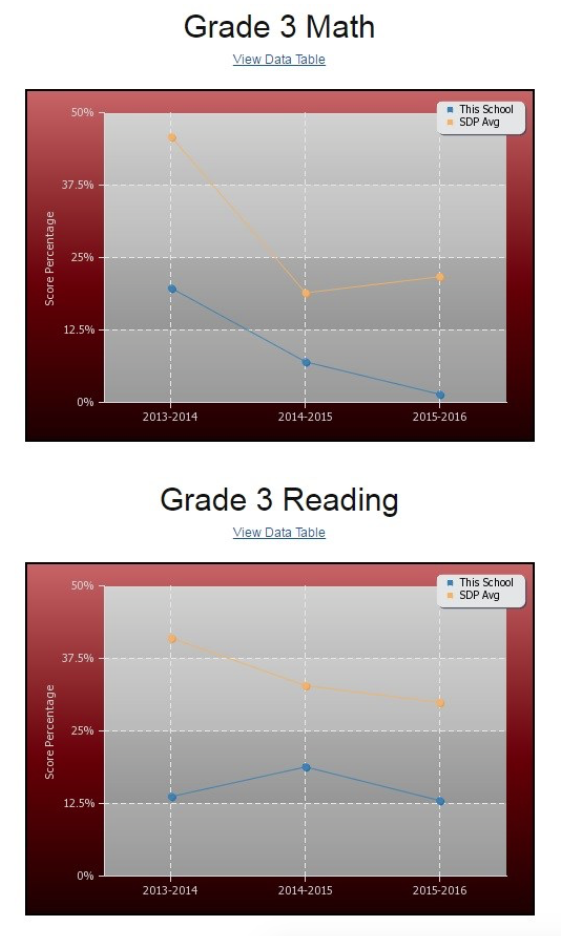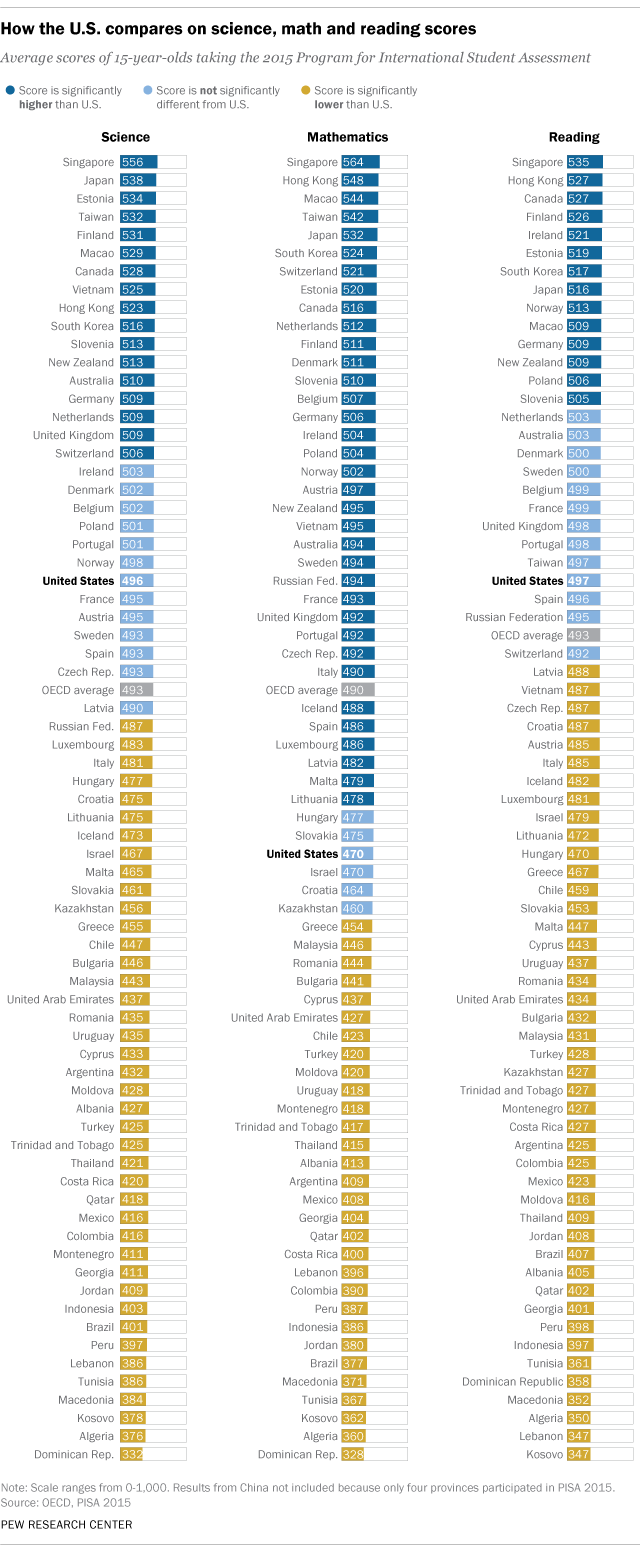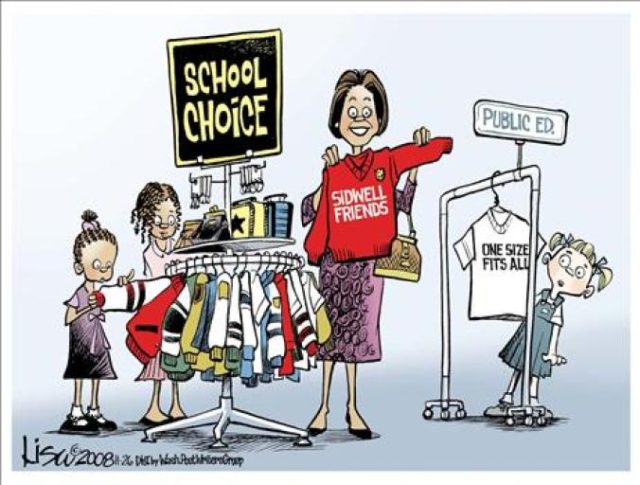 The nomination of Betsy DeVos was fraught with criticism from the left. She was derided for having “no experience with public education, no political experience, no government administrative experience,” and her support for school vouchers/charter schools, among many other things. Notably, most of the criticism came from educators, many of them members of the teachers’ unions, who have had many years and more than enough funding to fix failing public schools, with little (if any) success.
The nomination of Betsy DeVos was fraught with criticism from the left. She was derided for having “no experience with public education, no political experience, no government administrative experience,” and her support for school vouchers/charter schools, among many other things. Notably, most of the criticism came from educators, many of them members of the teachers’ unions, who have had many years and more than enough funding to fix failing public schools, with little (if any) success.
Which all begs the question – if your student is enrolled at a failing public institution, why should he/she be forced to remain enrolled there?
Recently, someone shared the experience of “Madeline” (the mother of a Philadelphia school student) and “Steve” (the student himself). Their names have been changed for the purpose of this article, which as Madeline explains, is more than likely necessary, so they do not face reprisal from public school educators and administrators. For her and her son, having a choice has meant the difference between years wasted in a failing school, and a real chance at a real education.
Madeline and Steve, both African Americans, live with Madeline’s husband in West Philadelphia, where most families are hard working but underpaid by any standard. Steve attended John Barry Elementary School (Grades K-8) from Kindergarten through 3rd grade. They both described the school as “terrible,” among several other less than savory terms. Every day there were fights, with girls pulling hair out, and kids would turn over desks/chairs before running through the halls while class was in session. Teachers would try to break up fights, but would more often call security, who would remove the offending student. If the issue couldn’t be resolved, parents would be called, who wouldn’t always show up to take the child away. If teachers took away phones from students who used them during class, they would curse at teachers and administrators with little fear of reprisal, sometime assaulting teachers.
Security consisted of one police officer. Lockers were not considered safe, and oftentimes items left in them would be stolen by other students. The food was considered to be “awful” by Steve, and the bathrooms were filthy, with urine on the floor and by the drains. Classes were approximately 30 students each, with the principal changing every year. Notably, Steve was academically ahead of his classmates – most of the students did not want to be in school, and were extremely disruptive. Steve had one good teacher, but he noted that the teacher had difficulty actually teaching anything, since there were so many disruptive students. Steve stated his only positive experience from the school were his field trips to a farm and a circus.
If you look at the performance of John Barry Elementary Schoo, you can see this for yourself. Reproduced below are the PSSA charts for Grade 3 (the one grade listed that Steve was in attendance for), and unsurprisingly they are far below the SDP average.
 Also below is the teacher attendance for John Barry, which is far below the SDP average as well.
Also below is the teacher attendance for John Barry, which is far below the SDP average as well.
 Madeline (unsurprisingly) did not want to keep Steve in John Barry, seeing it as a hostile environment to not just learning, but Steve’s safety, and his development as a person. She feared that leaving him in this school would bring out the worst in him, and that could lead him to a life of crime or worse. Madeline put her son on a waiting list to get into a charter school, later finding out that only 1 of every 3 applicants were accepted, and she believes some schools have a lottery. Her son got into Mathematics, Civics, & Sciences Charter School of Philadelphia (K-12), courtesy of two friends’ cousins who used to teach at the school.
Madeline (unsurprisingly) did not want to keep Steve in John Barry, seeing it as a hostile environment to not just learning, but Steve’s safety, and his development as a person. She feared that leaving him in this school would bring out the worst in him, and that could lead him to a life of crime or worse. Madeline put her son on a waiting list to get into a charter school, later finding out that only 1 of every 3 applicants were accepted, and she believes some schools have a lottery. Her son got into Mathematics, Civics, & Sciences Charter School of Philadelphia (K-12), courtesy of two friends’ cousins who used to teach at the school.
Her son said that from the day he got to the school, he was actually learning. The kids were all serious, and not playing around. The teachers were “not soft, striking fear into unruly students,” and the students subsequently respected the teacher and wanted to be productive. The teachers, in turn, trusted the kids, but there is still far more security, with one guard in each hallway. The principal frequently interrupts classrooms and asks students what they are learning, sometimes having “guests” present to evaluate the teachers. The most positive experience that Steve shared is the teachers are “top notch,” and he feels he is finally learning something at school.
It’s not all perfect for Steve though – the school doesn’t have a gym, and not a lot of sports and physical education are available. There is a basketball program, but the school needs to use facilities at other schools. Still, that was the only negative relative to John Barry that MCS Charter had in everything that was discussed. A recent article in Philly.com which described a similar charter school in Northeast Philadelphia was described by Madeline as “very similar” to her experience with MCS.
Finally, Madeline was asked about Betsy DeVos – if she know who she was (she did), and of the criticisms that were sent her way. Her answer was brief – “the criticisms are true – she doesn’t know much about public school.” But then she added, “would anyone really want to know more about John Barry, besides how to get their student out of the school?”
Which brings me back to the criticisms lobbed at DeVos, again by HuffPo. They quoted some things the DeVos said in March 2015 at the SXSW conference in Texas. Some excerpts:
Government really sucks. And it doesn’t matter which party is in power. Having been around politics and government my entire adult life, I have five observations about government for you:
Government tends to believe in top down solutions and government fears of bottom up solutions.
We don’t pay teachers enough, and we don’t fire teachers enough.
In that one sentence, I have raised the ire of both the Republican and Democrat political establishments.
The Republicans don’t want to pay our best teachers enough, and the Democrats don’t want to reform tenure laws. It’s another partisan standoff.
But I am willing to bet that every one of you had one or more teachers who made a big difference in your life, who opened your eyes to possibilities and to opportunities. You probably recall them in your mind’s eye right now.
And likewise, I am pretty sure that every one of you had one or more teachers who should not have been teaching. That doesn’t mean they were bad people, or maybe they were, but regardless, they weren’t any good at teaching. You are probably thinking of those teachers right now.
And by the way, teaching is hard. It takes a lot of skill. Not everyone who tries can do it well. We need to admit that and act accordingly.
We should reward and respect great teachers by paying them more, and we should stop rewarding seniority over effectiveness.
As it applies to education, you would be hard pressed to find Madeline not in agreement with DeVos. Top-down solutions to education and government (read: teachers’ union) fears of bottom up solutions to education have led to a public school system that is behind the curve in nearly all examples.
This is not hyperbole – the US spends approximately $115,000 per student, which is fifth globally, behind only Austria, Luxembourg, Norway and Switzerland. But throwing money at the problem has not led to increased performance, as the Pew Research Center recently analyzed – our students score similar to the Slovak Republic, which spends less than half, at $53,000 per student:
 What a surprise – a PISA report has noted the following:
What a surprise – a PISA report has noted the following:
…among OECD countries, “higher expenditure on education is not highly predictive of better mathematics scores in PISA.”
We can reasonably conclude that instead of trying to throw money at the problem, it appears Betsy DeVos intends to “fix” the public school system by giving parents a choice of where to send their students to school. She appears prepared to use the exorbitant cost of public education to finance this choice, and forcing all schools financed with public dollars to become far more accountable for their own performance. Who ends up the big loser? Obviously, failing public schools – if enough students leave the failing schools behind, they will be forced to shutter their doors.
It should be of no surprise then, that teachers’ unions are fighting charter schools at every turn. A recent Forbes article did an exemplary job of dissecting their opposition:
Teachers’ unions often fight charter schools by claiming that they are less accountable to students and families because many operate under less burdensome regulations than do traditional public schools. The real reason for their opposition, of course, is that charter school teachers are not unionized. The reality is that charter schools are much more accountable to young people and their parents than are traditional public schools. If parents do not like their children’s charter schools, they can send their kids elsewhere. This threat of exit gives charter schools an incentive to raise the quality of the education they offer in order to retain students.
Despite union scaremongering, the verdict is in on charter schools: The public favors them 2 to 1. Among African Americans, who are arguably the biggest beneficiaries of alternative schooling options, the favorability ratio is greater than 3 to 1. Even public school teachers desert the union position on charter schools by a slim margin—38% of teachers favor them, and 35% are opposed.
With a favorability rating of 3 to 1 among African Americans, the ethnic group with the largest percentage of students in failing public schools, it should be quite surprising to learn that the NAACP opposes charter schools. Recently, the NAACP ratified a controversial resolution calling for a moratorium on expansion of charter schools, and stronger oversight of charter schools currently in existence.
Publications ranging from U.S. News to The National Review have struggled to answer this question:
The NAACP board will vote this weekend on a resolution urging a moratorium on the creation of new charter schools, on grounds that they worsen segregation and erode local control. This is not a new position for the nation’s oldest civil-rights organization, but it’s gotten more support than ever before — for example, from groups such as those affiliated with Black Lives Matter — and has drawn thoughtful repudiations by the New York Times and the Washington Post as well as the Wall Street Journal. As the Post’s editorial board noted, “that the beneficiaries of [charters] are, in large part, children of color hopefully is not lost on an organization that is supposed to be looking out for the interests of minority people.”
But Education Week said what no one else would:
“The African-American community was shut out of power and authority for so many years, even if African-Americans see the warts on the local district, it’s their district.”
So something else needs to be said, because no one else has said it: if you want your failing public school, you can keep your failing public school – no one is forcing anyone to put their kids into a charter school. But do not take away the option for someone else to remove their child from a toxic environment, and make their own choice on whatever they feel is the best place to send their children to school.
Betsy DeVos wasn’t brought in to enact more “reforms” or toss more money at what appears to be an unsolvable problem – instead, it appears she intends to do something that no one else has done in the past – give more students a choice of what to do with their education. The criticisms about her are all correct – she isn’t well versed in public school education, something she readily admits, but knows that it is failing our country’s students, no matter how much time and money has been spent for who knows how long to repair it. Isn’t a new approach long overdue?
Take note – former President Obama sent his kids to Sidwell Friends, a private school in the D.C. area. And who can blame him? D.C. public schools recently ranked dead last in the nation. Why should the rest of our nation’s students be given a “one size fits all” approach to public education, when that “one size” is a well-funded yet underperforming public school system?
 Written by Duane and published by Free Market Shooter ~ March 8, 2017.
Written by Duane and published by Free Market Shooter ~ March 8, 2017.
 FAIR USE NOTICE: This site contains copyrighted material the use of which has not always been specifically authorized by the copyright owner. We are making such material available in our efforts to advance understanding of environmental, political, human rights, economic, democracy, scientific, and social justice issues, etc. We believe this constitutes a ‘fair use’ of any such copyrighted material as provided for in section 107 of the US Copyright Law. In accordance with Title 17 U. S. C. Section 107, the material on this site is distributed without profit to those who have expressed a prior interest in receiving the included information for research and educational purposes. For more information go to: http://www.law.cornell.edu/uscode/17/107.shtml
FAIR USE NOTICE: This site contains copyrighted material the use of which has not always been specifically authorized by the copyright owner. We are making such material available in our efforts to advance understanding of environmental, political, human rights, economic, democracy, scientific, and social justice issues, etc. We believe this constitutes a ‘fair use’ of any such copyrighted material as provided for in section 107 of the US Copyright Law. In accordance with Title 17 U. S. C. Section 107, the material on this site is distributed without profit to those who have expressed a prior interest in receiving the included information for research and educational purposes. For more information go to: http://www.law.cornell.edu/uscode/17/107.shtml
